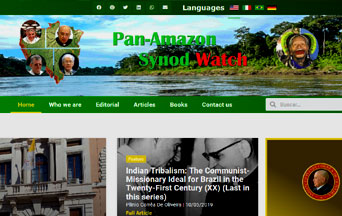
Crux, the well-known American Catholic online newspaper, published a long article signed by Christopher White, which deserves some comment.
Beginning with its title, “Catholic reactionary group raising its profile ahead of Amazon synod,” the article takes issue with “a network of far-right groups in Brazil … with a long history of opposing Vatican II … [the] Societies for the Defense of Tradition, Family and Property (TFP) [Plinio Corrêa de] Oliveira founded.” It defines the Pan-Amazon Synod Watch, created by the Plinio Corrêa de Oliveira Institute in Brazil, as “one of the primary hubs of resistance to the October gathering [Amazon Synod].”
The article’s description of the TFP, the Plinio Corrêa de Oliveira Institute, and our Pan-Amazon Synod Watch web site needs a lot of correction. Violating a fundamental principle of ethical journalism, “let the other side be heard,” Crux did not contact us to clarify some of its untruthful and positively defamatory statements. The American online newspaper limits itself to supplying an abundance of disparaging adjectives and opinions about us without ever touching upon the topics, facts, and documents published on our Pan-Amazon Synod Watch web site during these pre-synod months. In so doing, Crux blatantly sheds its sought-after veneer of a “progressive but moderate” publication capable of “listening,” an attitude much-touted nowadays.
Let us forget this flaw and focus instead on the article’s subtitle, referring to Plinio Corrêa de Oliveira as “The Godfather of the Synod Resistance.” According to the author, “Oliveira is in many ways the godfather of the resistance to the Amazon synod.” He obviously is not referring directly to the Catholic leader, deceased in 1995, but to his disciples, who form the world’s “largest coalition of associations in defense of Christian civilization.”
Plinio Corrêa de Oliveira: Man of Faith and Action
From his youth, White continues, Plinio Corrêa de Oliveira opposed the communist infiltration in the Church and society. In 1977, he wrote a book denouncing the indigenous and tribalist currents then expanding in Brazil in the wake of liberation theology. This work, according to White, is “a resource for understanding what’s at stake in the synod process.” Plinio Corrêa de Oliveira was a true pioneer in denouncing the important role that liberation theology and its surrogate, indigenous theology, play for both the Church and civilization. Indeed, they are the doctrinal foundation of the Synod today. Despite the farsightedness of the Brazilian thinker, who anticipated by decades what everyone now sees, White insinuates that his disciples are capitalizing on the topic only as a means for gaining “momentum.”
Citing Brazilian leftist sources—without ever hearing the other side—White calls Plinio Corrêa de Oliveira a “fascist,” ignoring the fact that he wrote no fewer than 450 articles against Nazism and Fascism in the Catholic newspaper Legionário when these ideologies were at their zenith. At the same time, a great figure of Brazilian Catholic progressivism, Archbishop Hélder Câmera, was ordained wearing the brown shirt of the Brazilian pro-fascist “integralist” movement under his cassock. The same sources eagerly heard by White accuse the TFPs of favoring the economic elite—forgetting that they defend private property as a principle of the natural order that applies to all. Since over 90% of Brazil’s owners have small and medium-size properties, it would be more appropriate to say that the TFP defends the weakest.
 Learn All About the Prophecies of Our Lady of Good Success About Our Times
Learn All About the Prophecies of Our Lady of Good Success About Our Times
Crux particularly targets the multi-lingual web site created by the Plinio Corrêa de Oliveira Institute to keep people informed about the Synod: “The Plinio Corrêa de Oliveira Institute has sought to raise the profile of its namesake’s legacy and ideas through the Pan-Amazonian Synod Watch, which serves as a clearing house for articles critical of the synod.”
White closes his article with an attack on Cardinal Gerhard Müller, whose “criticisms used similar language to that of Oliveira.” He does not exempt Cardinals Raymond Burke and Walter Brandmüller from reproach, accusing them of “resistance” to the Supreme Pontiff.
These prelates, along with other figures such as the Bishops Schneider, Azcona, and Keller have raised important theological and liturgical questions concerning the Synod’s preparatory working document. These questions, however, do not arise from a spirit of rebellion but from a deep love for the Vicar of Christ and a desire to serve the Bride of Christ. Certain outlets would do well to hear the advice of the great theologian Melchior Cano—quoted recently in a statement by Cardinal Raymond Burke and Bishop Athanasius Schneider—when he says, “Peter does not need our adulation. Those who blindly and indiscriminately defend every decision of the Supreme Pontiff are those who most undermine the authority of the Holy See: They destroy, instead of strengthening, its foundations.”
Eternal and Natural Law: The Foundation of Morals and Law
While Crux highlighted the work the TFPs have carried out regarding the upcoming Amazon Synod—albeit in a factious manner—America, the U.S. Jesuit magazine, published an article blaming “the challenge issued by the Institute Plinio Corrêa de Oliveira, which launched an international campaign against the Synod. … The IPCO is an outgrowth of the Society for the Defense of Tradition, Family and Property … [with] connections with big farmers and a record of anti-environmentalist activism.”
This article also deserves much correction. However, note how two major outlets of American Catholic progressivism recognize the extensive impact of the Pan-Amazon Synod Watch to keep the faithful informed of the pitfalls hidden in the developments of the upcoming Amazon Synod in Rome.
Indeed, we are not the ones reporting on our own impact. They’re saying it.
Articles related to the Synod on the Amazon may be found on Pan-Amazon Synod Watch, at https://panamazonsynodwatch.com/.

